Overview
The article examines the pivotal role of AI in enhancing efficiency within title research and various real estate operations, outlining ten specific use cases. It elaborates on applications such as:
- Automated title research
- AI-driven virtual tours
- Property valuation
- Predictive analytics
- Fraud detection
- Personalized recommendations
Each of these innovations streamlines processes, mitigates errors, and elevates client engagement in the real estate sector.
Introduction
The integration of artificial intelligence into the real estate sector is not merely a trend; it signifies a seismic shift in the conduct of property transactions and management. By automating time-consuming tasks such as title research and property valuation, AI is paving the way for enhanced efficiency and accuracy. This advancement allows professionals to concentrate on strategic decision-making. However, as the industry embraces these advanced technologies, pertinent questions emerge:
- What specific use cases are driving this transformation?
- How can real estate professionals leverage AI to optimize their operations?
This article explores ten compelling applications of AI in real estate that promise to revolutionize the landscape, from enhancing buyer engagement through virtual tours to ensuring transaction integrity with fraud detection.
Parse AI: Automating Title Research for Enhanced Efficiency
Parse AI employs advanced machine learning algorithms and optical character recognition to automate the extraction of critical information from title documents. This innovative automation significantly reduces the time required for , enabling professionals to concentrate on more strategic tasks. Furthermore, by minimizing human errors and enhancing precision, Parse AI transforms the traditional title research landscape, which demonstrates real estate use cases for AI, making property transactions quicker and more reliable.
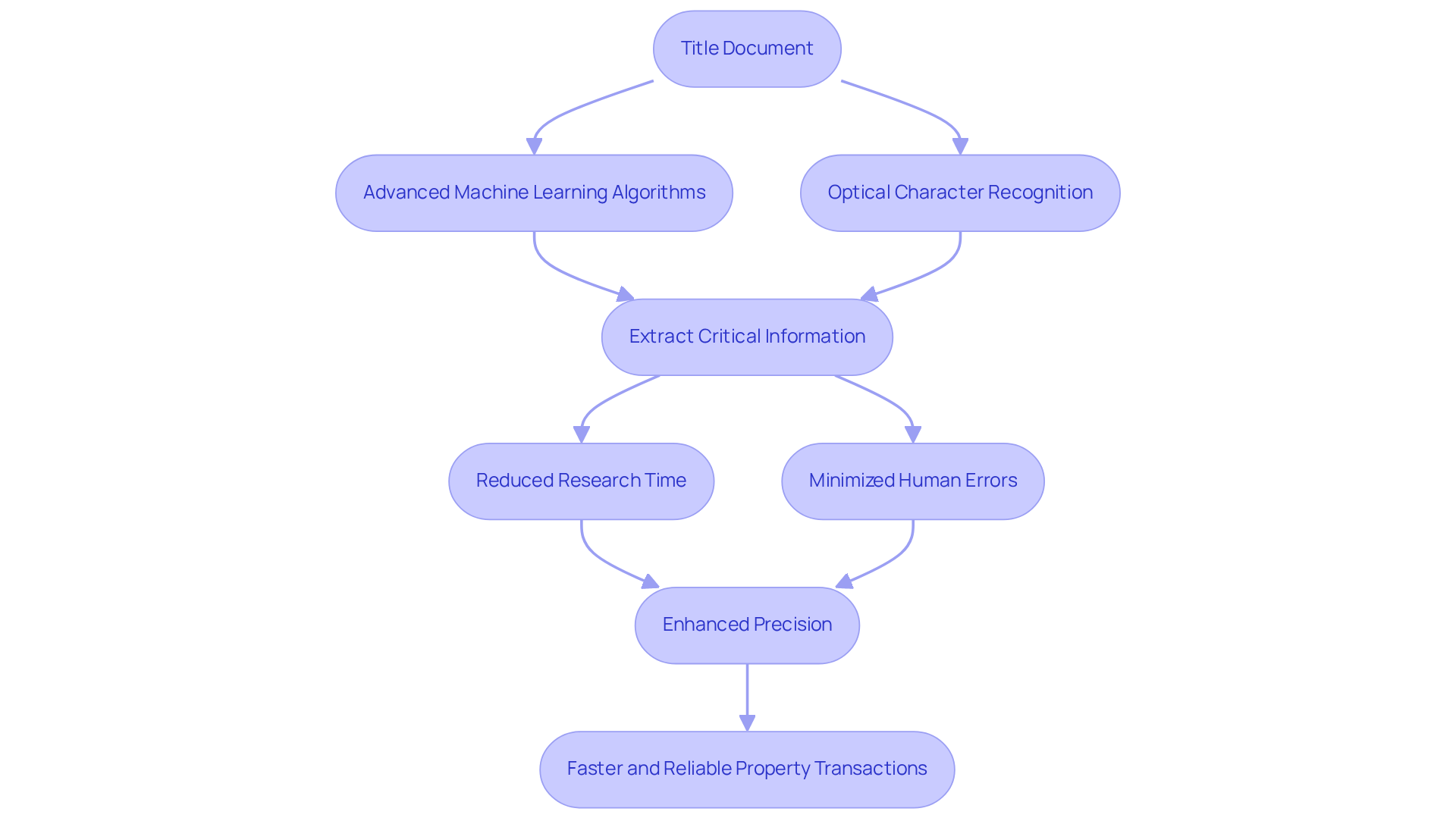
Virtual Tours: Enhancing Buyer Engagement with AI Technology
AI-powered virtual tours empower prospective buyers to explore properties from the comfort of their homes, revolutionizing the property experience. These tours are enhanced with interactive features such as 3D walkthroughs and augmented reality elements, cultivating a more immersive and engaging environment. Furthermore, by leveraging AI to analyze user interactions, property professionals can customize the virtual tour experience to align with buyers' specific interests. This tailored approach not only boosts engagement but also significantly elevates conversion rates, with resulting in a 33% increase in user satisfaction.
As Mary Critz aptly states, "Personalization is no longer a luxury; it’s a necessity." Consequently, to fully harness the benefits of AI-driven virtual tours, property professionals must explore real estate use cases for AI that offer customizable features to enhance buyer engagement.
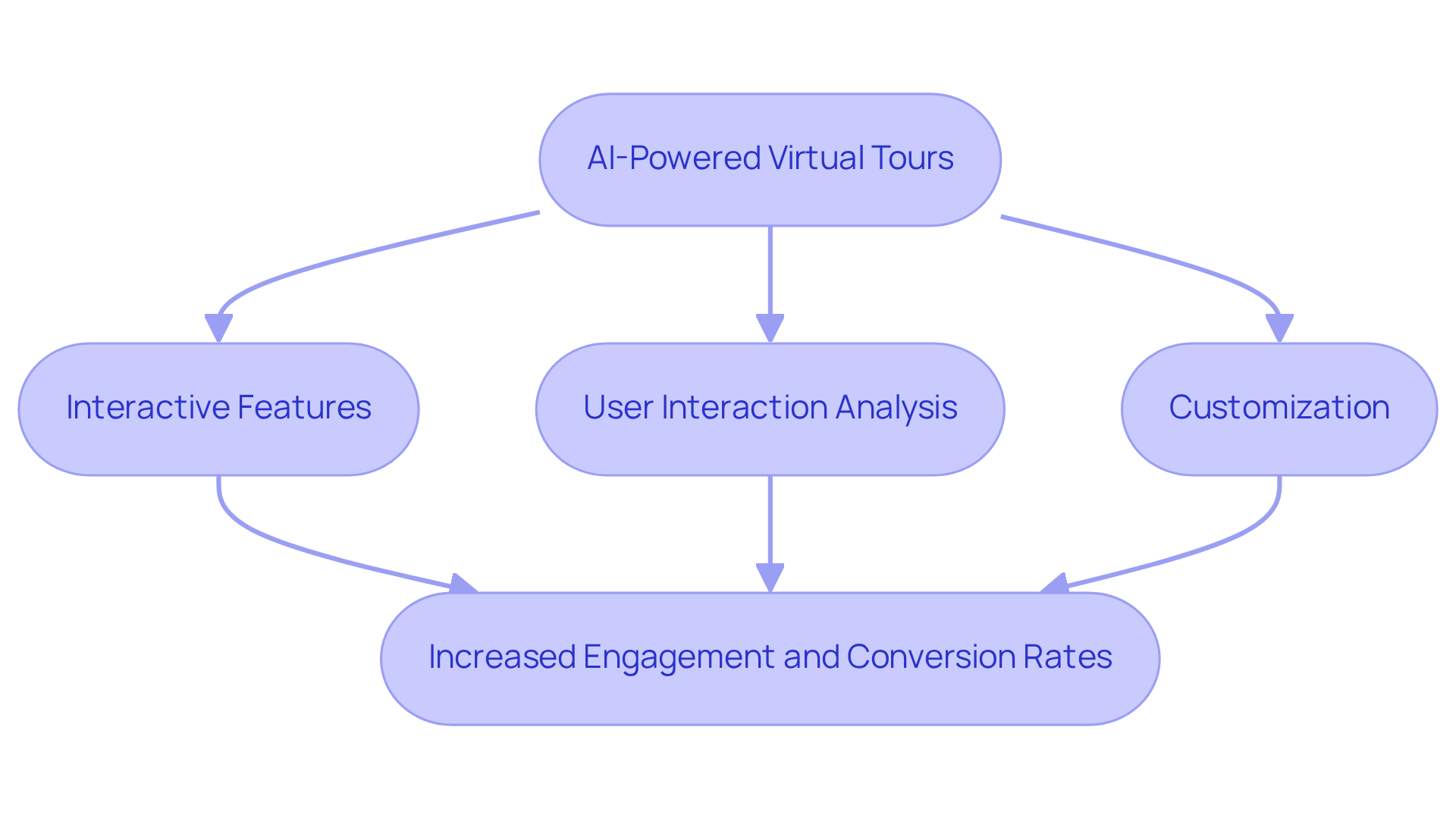
AI-Driven Property Valuation: Ensuring Accurate Pricing
The development of AI-powered real estate valuation tools showcases real estate use cases for AI by leveraging advanced algorithms to analyze historical sales data, current market trends, and specific asset features, resulting in precise evaluations. By automating this essential process, real estate professionals can leverage real estate use cases for AI to competitively price properties, significantly mitigating the risk of overpricing or underpricing. This level of accuracy not only accelerates the sales process but also fosters trust with clients who rely on , demonstrating real estate use cases for AI.
Statistics reveal that in the absence of AI, pricing inaccuracies can lead to substantial financial losses; for instance, severe convective storms last year resulted in $60 billion in insured losses. As George deMenocal, CEO of Aon’s U.S. Reinsurance Solutions, asserts, "Our collaboration with ZestyAI is part of Aon’s technological evolution to deliver new products that meet clients’ needs today and tomorrow, in a transparent and efficient way."
This amalgamation of extensive information is crucial for making informed pricing decisions, ultimately enhancing the overall efficiency of title research.
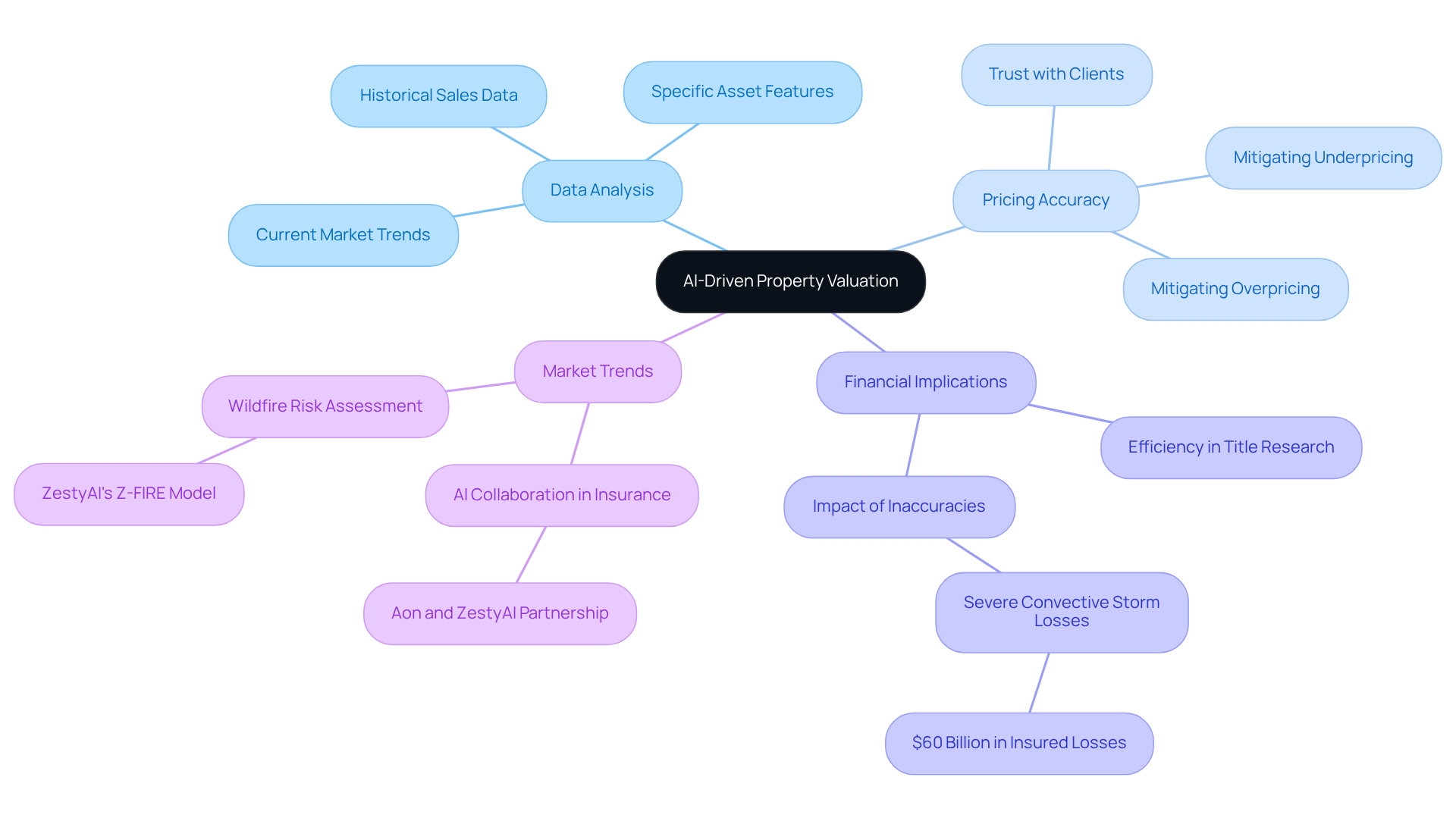
Predictive Analytics: Anticipating Market Trends with AI
Predictive analytics, powered by AI, plays a crucial role in analyzing historical data alongside current market conditions to identify real estate use cases for AI in forecasting future trends. This capability empowers property professionals to:
- Identify emerging markets
- Understand buyer preferences
- Leverage real estate use cases for AI to make informed investment decisions
By leveraging these insights, agents can strategically position themselves in the market, ensuring they remain competitive and responsive to changes.
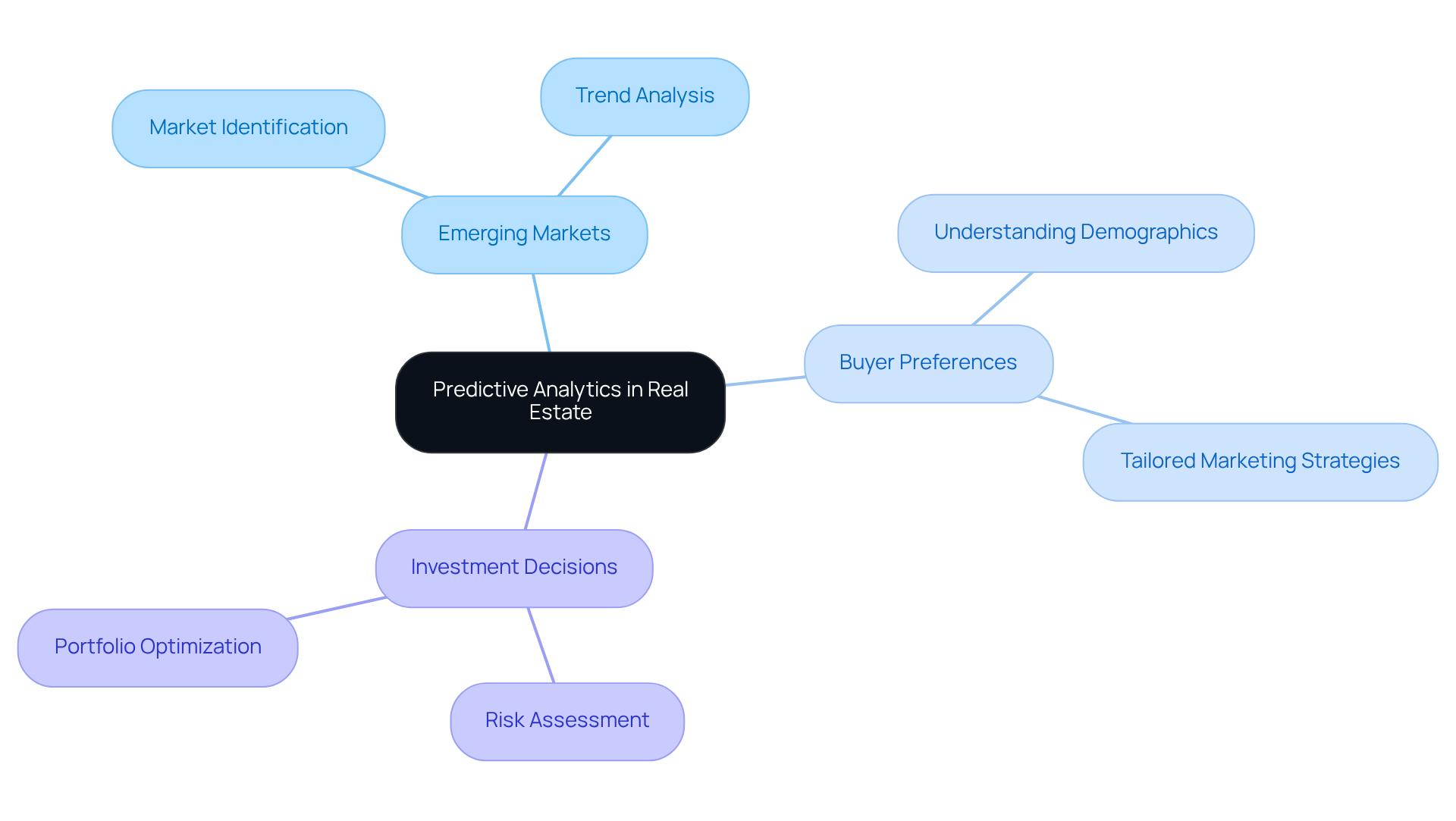
Fraud Detection: Leveraging AI to Ensure Transaction Integrity
AI technologies are revolutionizing the property sector by analyzing transaction patterns and identifying anomalies that may signal fraudulent activity. Through sophisticated , property professionals can detect potential fraud in real-time, facilitating prompt action to mitigate risks. This proactive strategy not only protects the integrity of transactions but also cultivates trust with clients who prioritize security in their dealings.
As Franklin D. Roosevelt observed, property is one of the most secure investments when managed prudently, and upholding transaction integrity is a crucial aspect of that oversight. Furthermore, with buyers deciding within the first 8 seconds of viewing a property whether to purchase it, the importance of trust and security in property transactions cannot be overstated.
Firms that harness machine learning to ensure transaction integrity are establishing a new benchmark in the industry, reinforcing the idea that a secure transaction environment is fundamental to successful real estate use cases for AI. As Suze Orman stated, 'Owning a home is a keystone of wealth… both financial affluence and emotional security,' underscoring the emotional weight of secure transactions.
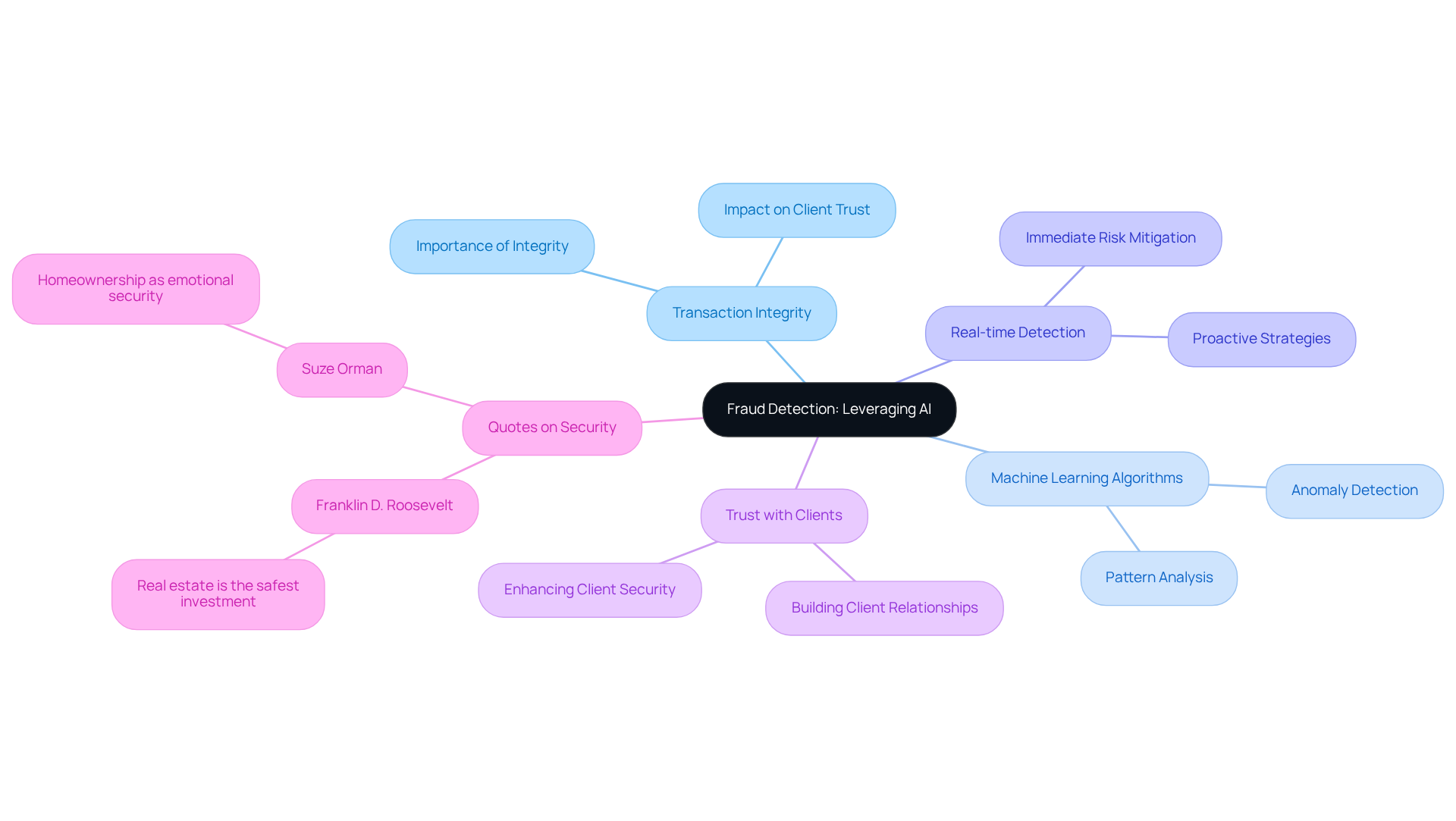
Personalized Recommendations: AI Enhancing Property Searches
AI algorithms assess user preferences and behaviors to provide personalized recommendations, showcasing real estate use cases for AI that significantly enhance the search experience. By evaluating factors such as location, budget, and preferred features, AI streamlines the search process, allowing buyers to swiftly discover suitable listings. This tailored approach not only saves time but also increases the likelihood of finding the ideal home, thereby .
For instance, Zillow reports that AI-driven personalized search refinements have led to a 33% increase in user engagement, underscoring the effectiveness of these technologies in addressing buyer needs. Furthermore, McKinsey research reveals that 71% of consumers expect tailored suggestions, highlighting the critical role of personalization in AI searches.
Platforms like Realtor.com utilize AI to provide customized insights for home improvement projects, ensuring users receive relevant suggestions aligned with their preferences. A notable example is Dhruv Sharma, a first-time homebuyer who successfully navigated the housing search process using AI insights, exemplifying the practical advantages of these technologies.
As the real estate industry increasingly adopts AI, the impact on search satisfaction rates is becoming more evident, with firms leveraging real estate use cases for AI to enhance client experiences and optimize operations.
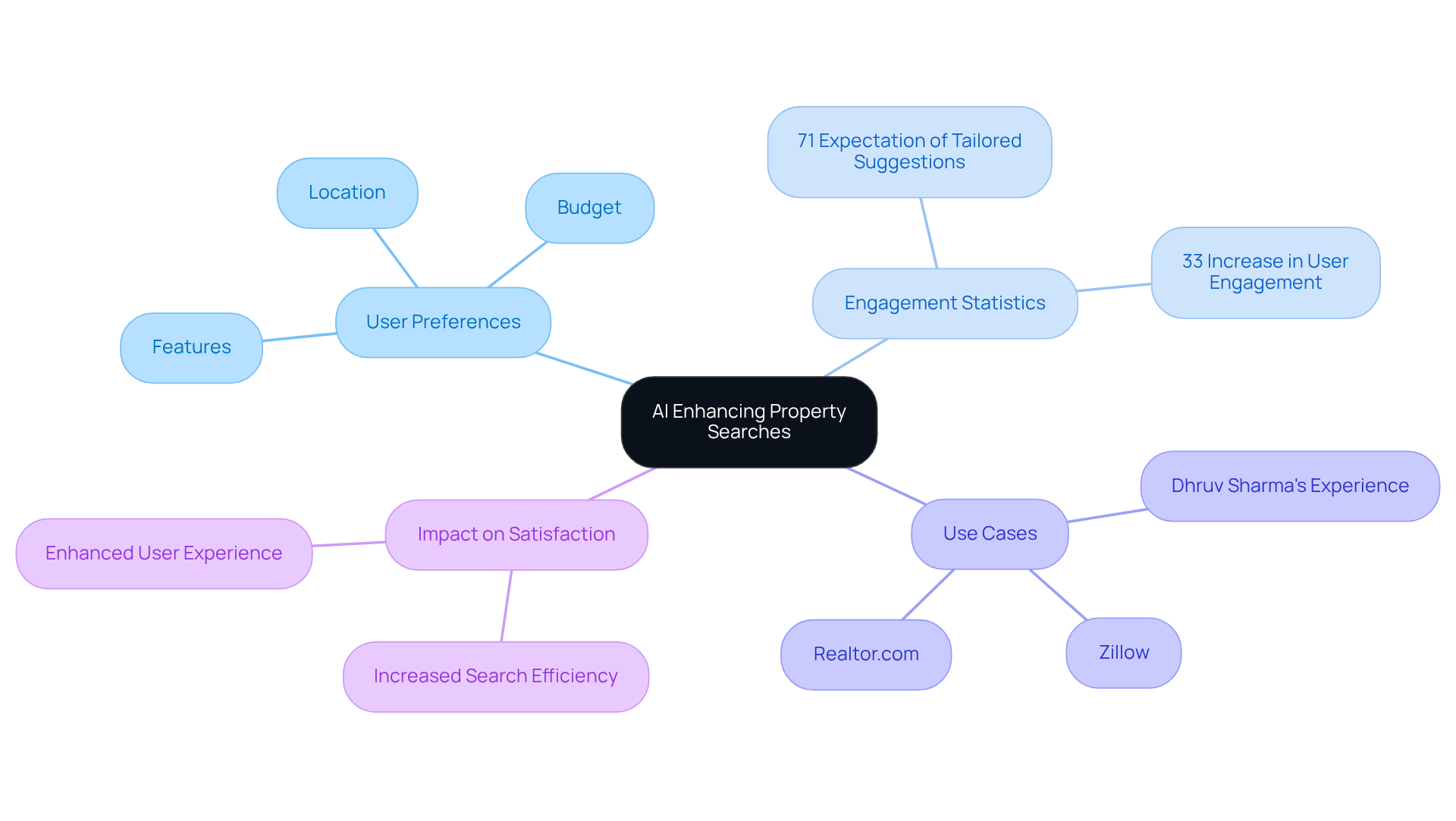
AI in Property Management: Streamlining Operations for Better Tenant Satisfaction
AI is revolutionizing real estate management through various real estate use cases for AI by automating essential tasks such as maintenance requests, rent collection, and tenant communication. Recent findings reveal that 85% of Managed Service Providers (MSPs) grapple with manual processes, underscoring the pressing need for efficient solutions like AI.
The deployment of chatbots and predictive maintenance tools empowers managers to deliver prompt responses and proactive service, significantly enhancing tenant satisfaction. As noted by Brad Cleveland, effective strategy and planning are crucial for improving customer experience, a principle that is directly applicable to real estate management.
This enhancement in service quality not only cultivates but also results in reduced operational costs. Consequently, real estate managers can redirect their focus toward strategic initiatives that foster growth and efficiency.
As organizations increasingly adopt AI solutions, they are identifying real estate use cases for AI, transitioning from traditional methods to more efficient operations, ultimately benefiting both tenants and management teams.
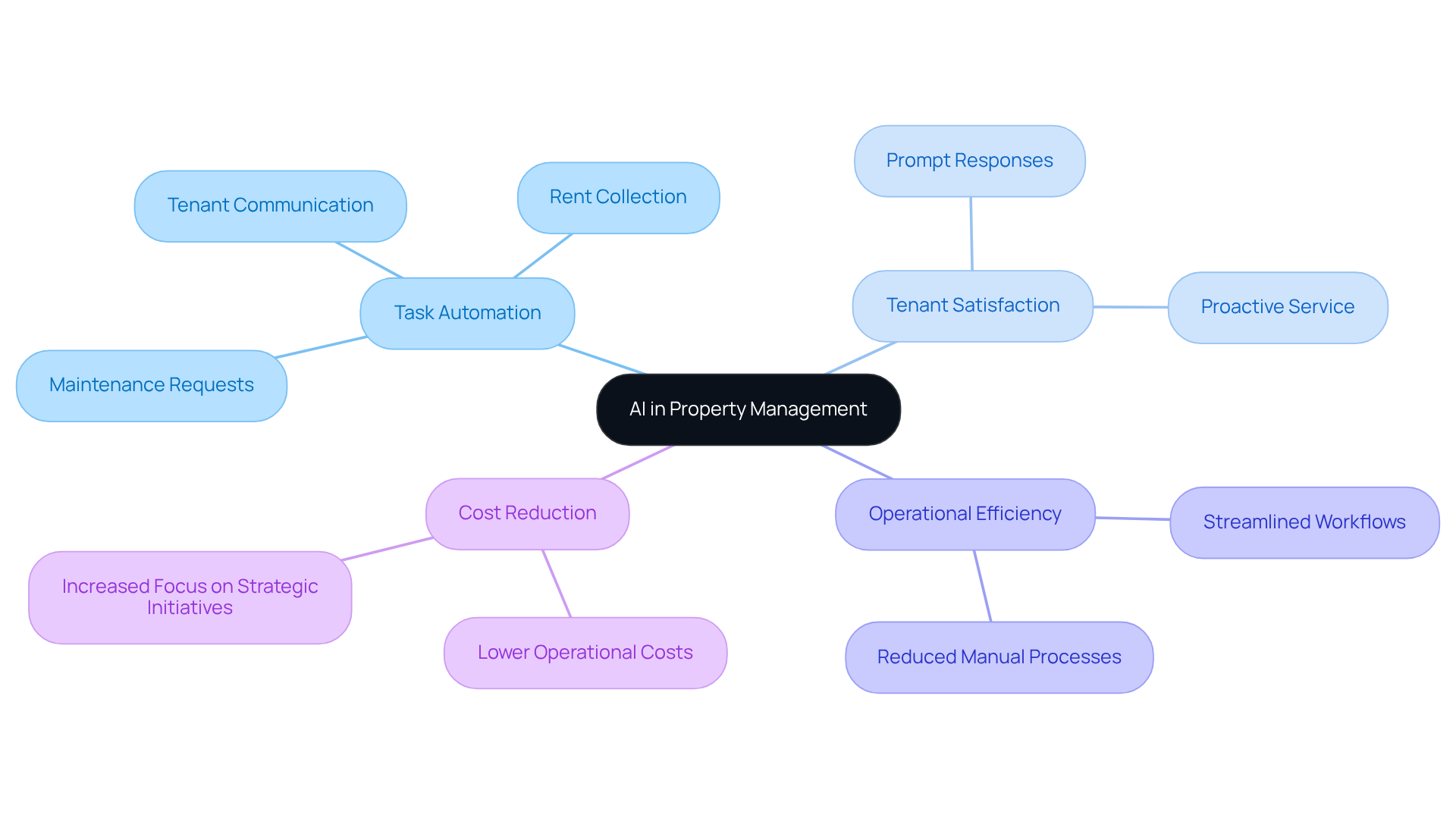
Investment Analysis: Utilizing AI for Informed Real Estate Decisions
AI tools are revolutionizing investment analysis in property by meticulously evaluating market conditions, property performance, and economic indicators, highlighting real estate use cases for AI. This analytical capability empowers investors to make that align with their financial objectives. By leveraging data-driven insights, AI aids in identifying high-potential opportunities, illustrating various real estate use cases for AI, while effectively mitigating risks associated with property investments.
Notably, over 90% of C-suite executives believe that AI will significantly transform workforce processes in the next five years, underscoring the necessity for strategic implementation of AI technologies in commercial property. Furthermore, the surge in private funding for AI, which reached $109 billion in 2024, is driving demand for property as AI firms expand their footprint.
As AI continues to evolve, its ability to provide precise, actionable insights—including applications like AI-driven underwriting, predictive analytics, and various real estate use cases for AI—will be crucial for property investors aiming to adeptly navigate complex market dynamics. However, it is vital to acknowledge the considerable legal challenges associated with AI in property management, which must be addressed to fully harness its potential.
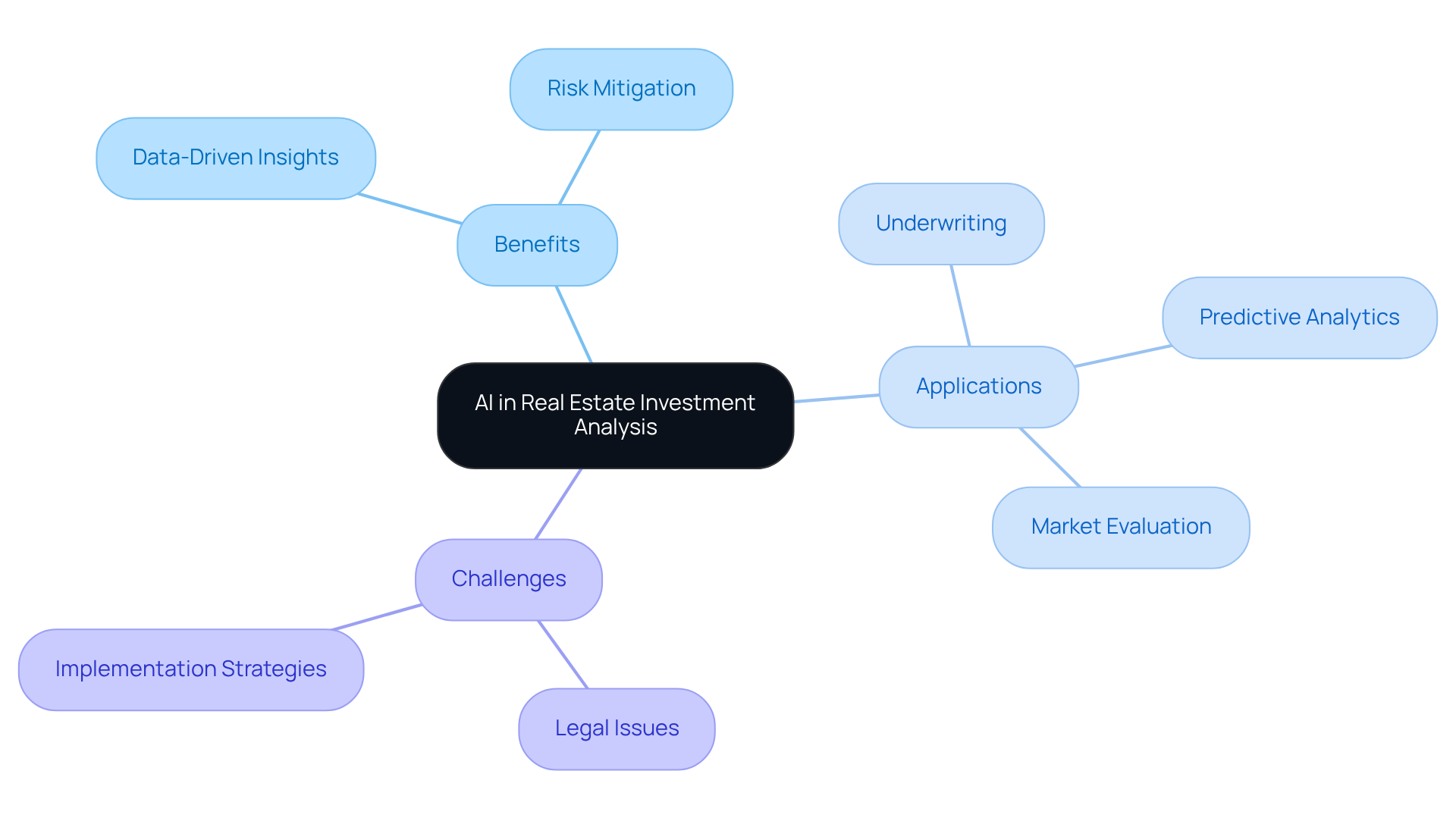
AI in Marketing: Transforming Strategies to Reach Buyers Effectively
AI plays a pivotal role in analyzing consumer behavior and preferences, which highlights several real estate use cases for AI that enable professionals to refine their marketing strategies. By utilizing analytics, agents can create focused campaigns that connect with prospective buyers, greatly enhancing engagement and conversion rates.
However, the application of AI in marketing also presents challenges, such as initial expenses and the requirement of ensuring information quality for effective results. Furthermore, automation of ad placements through AI-driven marketing tools not only streamlines the process but also facilitates performance tracking, allowing for ongoing optimization of marketing efforts.
In addition, AI chatbots enhance customer engagement by providing instant responses to inquiries, further personalizing the buyer experience. This approach is essential in a competitive landscape where personalized experiences are increasingly expected by consumers.
As noted, businesses utilizing AI for lead scoring have seen a 30% increase in sales productivity, underscoring the effectiveness of these strategies. Moreover, personalized emails yield an open rate 29% higher than generic ones, highlighting the importance of tailored communication in enhancing consumer engagement.
Ultimately, is crucial for maintaining strong client relationships while leveraging technology to explore real estate use cases for AI to improve marketing effectiveness.
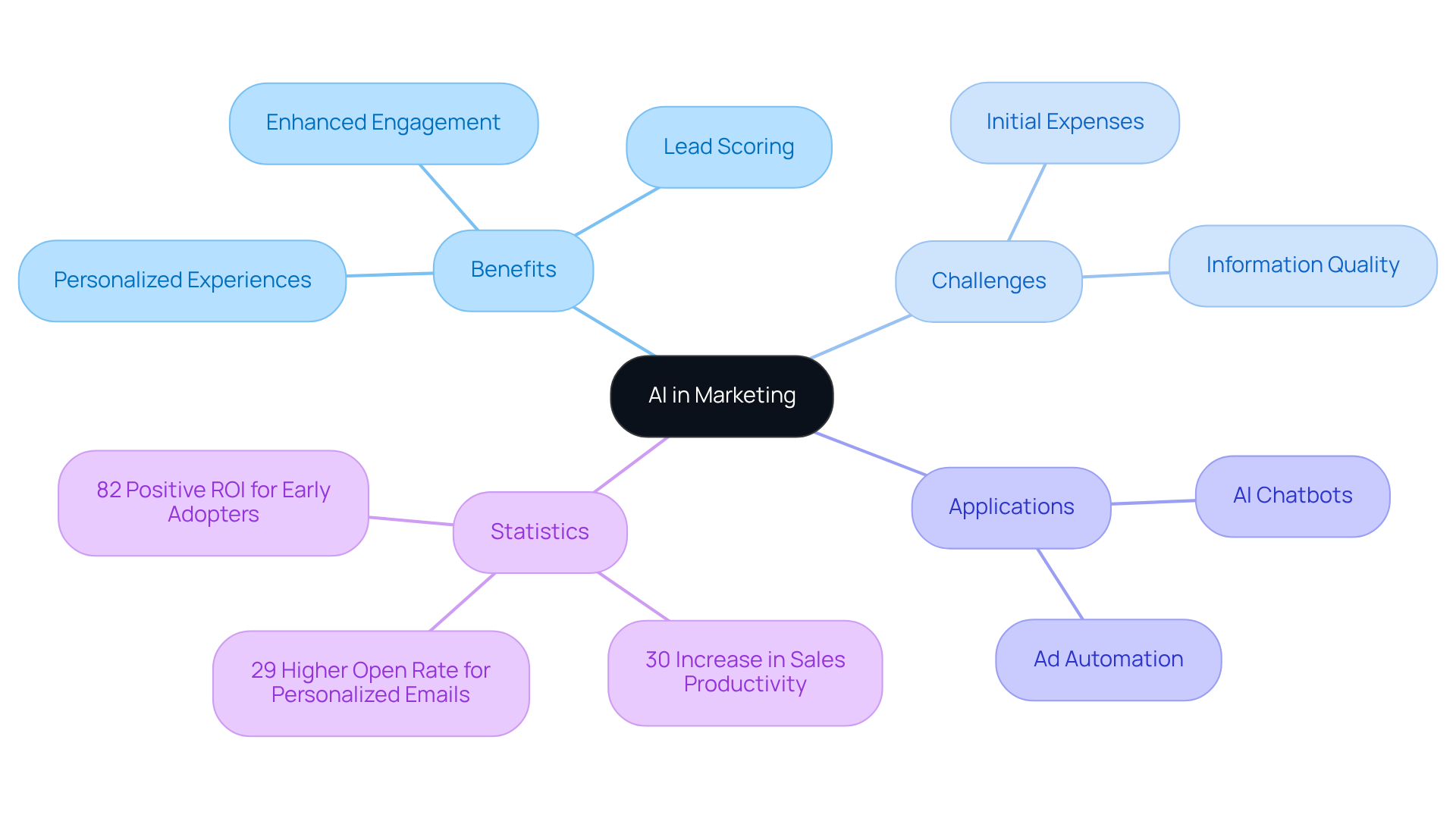
Challenges and Opportunities: Navigating AI Adoption in Real Estate
AI presents significant potential to enhance efficiency in title research and broader property operations, illustrating real estate use cases for AI. However, many firms lack a structured approach for deploying AI, and the journey toward effective integration is fraught with challenges, particularly concerning information privacy. As real estate firms increasingly embrace AI technologies, they must adeptly navigate the complexities of protecting sensitive information while incorporating these systems into established workflows. A strategic approach to AI adoption is essential, emphasizing gradual implementation and ongoing staff training to mitigate privacy-related risks.
To address these concerns, firms can employ several strategies:
- Data Encryption: Implement robust encryption methods to safeguard sensitive data during transmission and storage.
- Access Controls: Establish strict access controls to ensure that only authorized personnel can access sensitive information.
- Regular Audits: Conduct routine audits and evaluations to identify potential vulnerabilities and ensure compliance with protection regulations.
- Employee Training: Provide comprehensive training for staff on information privacy best practices and the ethical application of AI technologies.
By proactively addressing these information privacy issues, property professionals can harness the capabilities of AI to drive innovation and enhance overall business performance. As Raj Singh, Managing Partner at JLL Spark, remarked, "The key to making the leap from pilots to successful products hinges on data quality, workflow integration, and intuitive output interfaces." This highlights the necessity of a considered approach to AI that prioritizes both efficiency and ethical considerations. Moreover, with over 60% of companies initiating pilots for various real estate use cases for AI within their functions, the industry stands on the brink of significant transformation. Embracing contactless transactions and improved building management through AI can further bolster operational efficiency and client satisfaction.
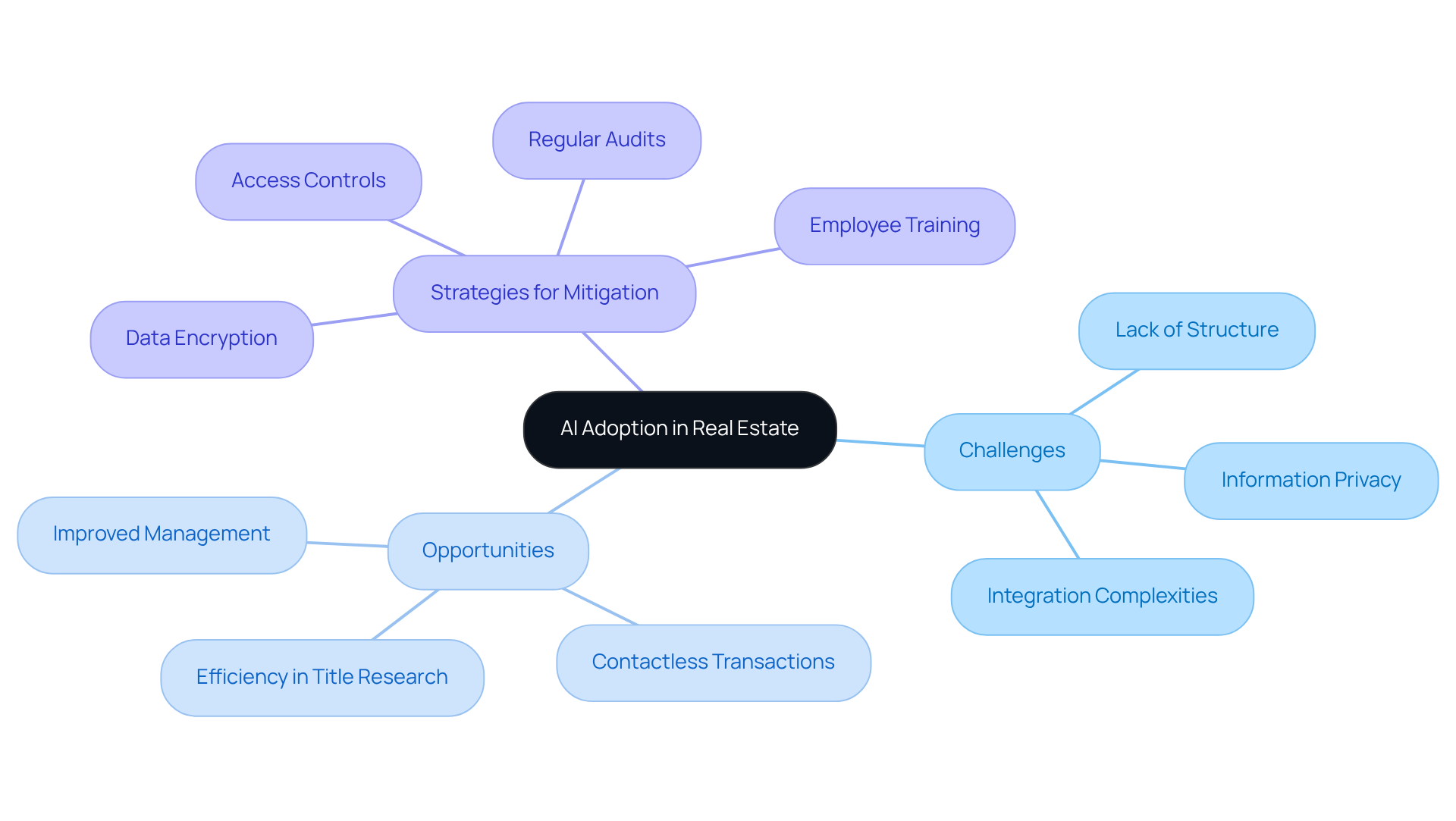
Conclusion
The integration of artificial intelligence in real estate is revolutionizing the industry, particularly in enhancing title research efficiency and streamlining various operational processes. By leveraging AI technologies, professionals can significantly reduce human error, increase accuracy, and save valuable time, allowing them to focus on more strategic aspects of their work. The implications of these advancements are profound, as they pave the way for faster, more reliable property transactions and improved client satisfaction.
Throughout this discussion, several key applications of AI in real estate have been highlighted. These include:
- Automated title research
- AI-driven virtual tours
- Accurate property valuation
- Predictive analytics for market trends
- Fraud detection
- Personalized recommendations
- Enhanced property management
Each of these use cases illustrates how AI not only improves efficiency but also fosters a more engaging and secure environment for buyers and investors alike. As the industry continues to evolve, the adoption of AI technologies will be crucial in navigating challenges and seizing opportunities.
The significance of embracing AI in real estate cannot be overstated. As firms implement these technologies, they stand to gain a competitive edge by enhancing operational efficiency and improving customer experiences. The call to action is clear: real estate professionals should actively explore and integrate AI solutions into their practices to not only keep pace with industry advancements but to lead the charge towards a more innovative and effective real estate landscape.
Frequently Asked Questions
What is Parse AI and how does it improve title research?
Parse AI uses advanced machine learning algorithms and optical character recognition to automate the extraction of critical information from title documents, significantly reducing the time required for title research and allowing professionals to focus on more strategic tasks while minimizing human errors and enhancing precision.
How do AI-powered virtual tours benefit prospective buyers?
AI-powered virtual tours allow prospective buyers to explore properties from home with interactive features like 3D walkthroughs and augmented reality, creating a more immersive experience. These tours can be customized based on user interactions, boosting engagement and significantly increasing conversion rates, with personalized experiences leading to a 33% increase in user satisfaction.
What role does AI play in property valuation?
AI-driven property valuation tools analyze historical sales data, current market trends, and specific asset features to ensure accurate pricing. This automation helps real estate professionals competitively price properties, reducing the risk of overpricing or underpricing, which fosters trust with clients and accelerates the sales process.
What are the consequences of pricing inaccuracies in real estate?
Pricing inaccuracies can lead to significant financial losses. For example, severe convective storms last year resulted in $60 billion in insured losses, highlighting the importance of accurate pricing facilitated by AI to avoid such financial impacts.
Why is personalization important in the context of AI-driven virtual tours?
Personalization is essential because it enhances buyer engagement and satisfaction. As stated by Mary Critz, "Personalization is no longer a luxury; it’s a necessity," indicating that tailored experiences are crucial for effectively connecting with buyers and improving their overall experience.




